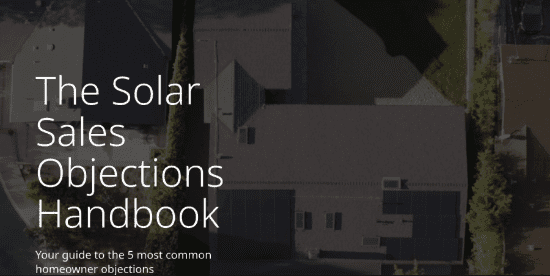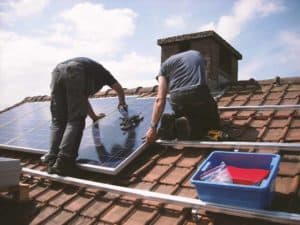Any time you get work done on your house, there’s a chance something will go wrong. It’s rare, but it’s just a fact of life — whether you’re getting new floors or, yes, getting a solar system installed.
So, however uncommon it may be, some potential customers will have heard at least one solar panel horror story. Knowing this, salespeople have to come prepared with a plan for dealing with homeowners who have this concern.
For the Solar Sales Objections Handbook, we asked five industry experts what they do when faced with this sales objection. They emphasized things like weather resistance, minimally invasive racking techniques, and your company’s reputation can help. Add that professionally installed solar panels rarely cause damage, and in the unlikely event of an accident, roof penetration warranties can fill the gap.

The Objection: We’re Concerned about Roof Damage
“I just put a new roof on the house, so I don’t want to void my roof warranty. I understand you offer a warranty too, but it doesn’t cover as much as what my current one does.”
Address the System and Roof Penetration Warranty
Many homeowners are concerned that installing solar panels can void their roof warranty. Thankfully, much like how solar energy supplements utility electricity, a solar system’s warranty can also work alongside an existing roof guarantee.
To address the idea of roof warranties, “Solar Joe” Mousakheel, CRO of The Solar Academy, emphasized the need to assure the homeowner that their assets will be protected.
“If a homeowner is bringing this objection up, there’s a reason for it: They must really love their new roof. A roof is the last project a homeowner usually wants to do on their house, so once they put it on there, they want to take care of it. So it’s really important to help them understand that the roof will still be protected afterward.”
Nearly every panelist introduced the idea of a roof penetration warranty. If a roof’s warranty is voided, a roof penetration warranty will cover any damages where the solar energy system punctures or pierces the roof.
Lily Valdez, co-founder of Women United by Solar, favored a direct, simple approach:
“Your new roof has its warranty as is. And where we put the solar, my company provides a 30-year warranty for parts, labor, shipping, and roof penetrations.”
While every solar company can’t offer a 30-year performance and workmanship warranty, 10, 20, and 25-year periods are very common in the industry. Knowing this, Ashleigh Tatarcyk, owner of Urban Sol Energy, explains to the customer that a solar energy system’s guarantee will likely outlive the protection period on a new roof.
“You’re correct, most roof warranties will void where we are touching on the roof, but the really great thing about working with us is that we’ve got a 25-year penetration warranty. Most roof warranty contracts are about 5 years, so we’re actually going to extend that warranty. Anywhere that we’re touching on your roof, you’re being covered for longer than where we don’t touch.”

Explain Your Racking Method In-Depth
Even if a homeowner’s new roof is covered by a penetration warranty, they can still have concerns about possible damage and headaches that could have been avoided by not getting solar.
Modern racking methods are so good, though, that they generally make these concerns obsolete. The key is making sure you educate the customer.
Jake Hess, founder of The Solar Academy, explained that most homeowners are simply afraid of the unknown.
“Homeowners usually aren’t roofers, and they don’t know everything about it, but they do have the fear that holes are going in their roof. So I try to help them understand a little more about what the mounting process looks like.”
By explaining a racking method in-depth, potential customers are more likely to feel at ease with an expert installation. Here, Lily turns to video to give the homeowner a comprehensive look at how the solar will be installed.
“We don’t drill directly into your home, we actually use flashings. We have a little video here to show you exactly how that’s done.”
After giving his detailed explanation of the minimally invasive racking system and waterproofing process, Jake says that it’s important to let the homeowner know what’s at stake for your solar company if something were to go wrong: If there’s damage to a homeowner’s roof, there’s likely at least as much damage to the installer’s reputation.
“What we installers have to lose is our entire reputation, for everyone in this city, if your roof leaks. Everybody looks at reviews, so if they see that your roof leaks after you’ve told the world you’re using our company to go solar, that’s going to hurt our business a lot.”
Remember: Solar Panels Actually Protect Roofs
One thing that can often get lost among the warranties and company guarantees is that solar panels actually provide physical protection for roofs. Solar Joe described it like this:
“Solar panels are also a roof shield. This installation is going to protect your new roof in the future, it’ll protect it from sunshine, rain, hail, and will help your roof last even longer.”
Ashleigh drove home the point.
“The panels are actually acting as a protector. Instead of hail, or wind, or snow, or heat touching your roof, it’s now touching your panels, which have gone through rigorous weather testing.”
Emphasize that Now is the Best Time to Install Solar
Finally, for anyone interested in solar energy, right after installing a new roof is the perfect time. When panels are installed midway through the lifespan of a roof, there may be extra work required if the roof needs to be replaced.
As Solar Joe put it:
“Some homeowners wish they had a new roof to put solar on. That’s actually the best time to put solar on, when you have a new roof.”
With the original objection now turned on its head, James Ramos, founder of the Solar YOUniversity, circles back to savings can help close the deal. This is where solutions like Sales Mode can help drive these savings home.
In Closing…
In the end, a homeowner concerned about voided warranties or roof damages can represent more of a green light than a stopping point.
With added weather resistance, minimally invasive racking techniques, and a company’s reputation on the line, professionally installed solar panels will very rarely cause damages or leaks. And in the unlikely event of an accident, homeowners can rest easy knowing their investment is protected by a roof penetration warranty.
See what the experts have to say on other common solar objections:
- We Need Another Quote
- We’re Retired and On a Budget
- We’re Concerned About Damage to the Roof
- We’re Planning to Move Soon
- We’d Rather Use the Money for Other Investments
Want to learn more? Check out the Solar Sales Objections Handbook.

Featured image by Verstappen Photography.
